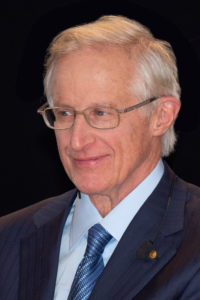
William D. Nordhaus
1944-

William D. Nordhaus was co-winner, along with Paul M. Romer, of the 2018 Nobel Prize in Economic Science “for integrating climate change into long-run macroeconomic analysis.”
Starting in the 1970s, Nordhaus constructed increasingly comprehensive models of the interaction between the economy and additions of carbon dioxide to the atmosphere, along with its effects on global warming. Economists use these models, along with assumptions about various magnitudes, to compute the “social cost of carbon” (SCC). The idea is that past a certain point, additions of carbon dioxide to the atmosphere heat the earth and thus create a global negative externality. The SCC is the net cost that using that additional carbon imposes on society. While the warmth has some benefits in, for example, causing longer growing seasons and improving recreational alternatives, it also has costs such as raising ocean levels, making some land uses obsolete. The SCC is the net of these social costs and is measured at the current margin. (The “current margin” language is important because otherwise one can get the wrong impression that any use of carbon is harmful.) Nordhaus and others then use the SCC to recommend taxes on carbon. In 2017, Nordhaus computed the optimal tax to be $31 per ton of carbon dioxide. To put that into perspective, a $31 carbon tax would increase the price of gasoline by about 28 cents per gallon.
Nordhaus noted, though, that there is a large amount of uncertainty about the optimal tax. For the $31 tax above, the actual optimal tax could be as little as $6 per ton or as much as $93.
Interestingly, according to Nordhaus’s model, setting too high a carbon tax can be worse than setting no carbon tax at all. According to the calibration of Nordhaus’s model in 2007, with no carbon tax and no other government controls, the present value of damages from environment damage and abatement costs would be $22.59 trillion (in 2004 dollars). Nordhaus’s optimal carbon tax would have reduced damage but increased abatement costs, for a total of $19.52 trillion, an improvement of only $3.07 trillion. But the cost of a policy to limit the temperature increase to only 1.5° C would have been $37.03 trillion, which is $16.4 trillion more than the cost of the “do nothing” option. Those numbers will be different today, but what is not different is that the cost of doing nothing is substantially below the cost of limiting the temperature increase to only 1.5° C.
One item the Nobel committee did not mention is his demonstration that the price of light has fallen by many orders of magnitude over the last 200 years. He showed that the price of light in 1992, adjusted for inflation, was less than one tenth of one percent of its price in 1800. Failure to take this reduction fully into account, noted Nordhaus, meant that economists have substantially underestimated the real growth rate of the economy and the growth rate of real wages.
Nordhaus also did pathbreaking work on the distribution of gains from innovation. In a 2004 study he wrote:
Only a minuscule fraction of the social returns from technological advances over the 1948-2001 period was captured by producers, indicating that most of the benefits of technological change are passed on to consumers rather than captured by producers.
Nordhaus earned his B.A. degree at Yale University in 1963 and his Ph.D. in economics at MIT in 1967. From 1977 to 1979, he was a member of President Carter’s Council of Economic Advisers.
About the Author
David R. Henderson is the editor of The Concise Encyclopedia of Economics. He is also an emeritus professor of economics with the Naval Postgraduate School and a research fellow with the Hoover Institution at Stanford University. He earned his Ph.D. in economics at UCLA.
Selected Works
1977. “Economic Growth and Climate: The Case of Carbon Dioxide.” American Economic Review, Vol. 67, No. 1, pp. 341-346.
1978. “Do Real-Output and Real-Wage Measures Capture Reality? The History of Lighting Suggests Not,” in Timothy F. Bresnahan and Robert J. Gordon, editors, The Economics of New Goods. Chicago: University of Chicago Press, 1996.
2000. (with J. Boyer.) Warming the World: Economic Models of Global Warming. Cambridge, MA: MIT Press.
2004. “Schumpeterian Profits in the American Economy: Theory and Measurement,” NBER Working Paper No. 10433, April 2004.
2004. “Projections and Uncertainties about Climate Change in an Era of Minimal Climate Policies,” NBER Working Paper No. 22933.
Related Links
Robert P. Murphy, William Nordhaus versus the United Nations on Climate Change, at Econlib, November 5, 2018.
Bjorn Lomborg on the Costs and Benefits of Attacking Climate Change, an EconTalk podcast, June 10, 2019.
Pedro Schwartz, Climate Change: What Is (Not) To Be Done, a review of Nordhaus’s Climate Casino at Econlib, April 6, 2020.
Robert P. Murphy, The Economics of Climate Change, at Econlib, July 6, 2009.
